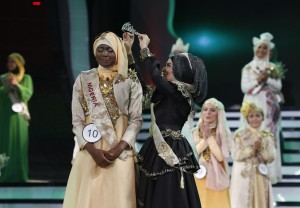A week before Indonesia also hosts the established Miss World pageant, capital city Jakarta hosted the 2013 Miss World Muslimah contest last week, crowning Nigerian entrant Obabiyi Aishah Ajibola queen for a year.
The contest, which was inaugurated to challenge western ideas of beauty, placed emphasis on contestants’ knowledge and views on Islam in the modern world and how well they were able to recite verses from the Qur’an.
The 21-year-old winner wept and dropped to her knees as her name was announced. She was awarded prize money of £1,365 and trips to Mecca and India.
The annual pageant, which evolved from a contest first held in 2011 exclusively for Indonesian Muslims, saw participants from 20 countries take part, including Bangladesh, Malaysia, Brunei and Iran. Countries were permitted to enter multiple contestants. The sole US finalist withdrew before the ceremony citing a family emergency.
The pageant was founded three years ago by Eka Shanti, who lost her job as a TV news anchor for refusing to remove her headscarf. Shanti billed the contest as “Islam’s answer to Miss World”.
“This year we deliberately held our event just before the Miss World final to show that there are alternative role models for Muslim women,” she said. “But it’s about more than Miss World. Muslim women are increasingly working in the entertainment industry in a sexually explicit way, and they become role models, which is a concern”, she said.
Around 90 percent of Indonesia’s 250 million people are Muslim, making it home to the world’s largest Muslim population. The established Miss World pageant, elements of which were to be held in Jakarta, has now been confined to the mainly Hindu island resort of Bali in response to pressure from Indonesia’s government. The lead-up to this week’s pageant has seen a groundswell of protests from hardline Indonesian Muslim groups.










